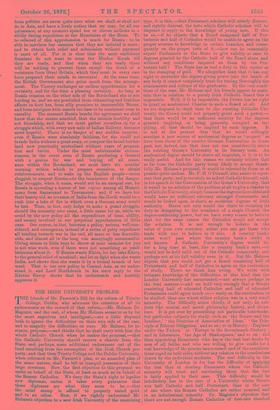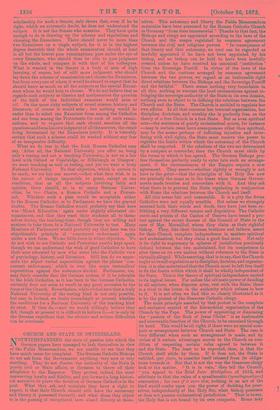TILE IRISH UNIVERSITY PROBLEM.
THE friends of Mr. Fawcett's Bill for the reform of Trinity 1_ College, Dublin, who advocate the retention of all its ,endowments as the reward, of that reform,—Mr. Holmes, Dr. Maguire, and the rest, of whom Mr. Holmes seems to us by far the most sagacious and intelligent,—are a little disposed both to ignore the difficulties on their own side of the case, and to magnify the difficulties on ours. Mr. Holmes, for in- stance, proposes,--and thinks that he shall carry with him the whole Catholic Church when he makes the proposal,—that the Catholic University should receive a charter from the State, and, perhaps, some additional endowment out of the fund resulting from the resumption of the Irish Church pro- perty, and that .then Trinity College and the Dublin University, when reformed on Mr. Fawcett's plan, or an amended plan of the same nature, shall be left in tranquil possession of their large revenues. Now, the first objection to this proposal we make on behalf of the State, at least as much as on behalf of the Roman Catholics. We deny the State's right to legalise new diplomas, unless it takes every guarantee that these diplomas are what they seem to be, —that the mint stamp is affixed to properly tested gold, -and to no other. Now, if we rightly understand Mr. Holmes's objection to a new Irish University of the examining
type, it is this,—that Protestant scholars will utterly distrust, and rightly distrust, the tests which Catholic scholars will be disposed to apply to the knowledge of young men. If this be so,—if he objects that a Board composed half of Pro- testants and half of Catholics would be unable to agree on the proper avenues to knowledge in certain branches, and conse- quently on the proper teats of it,—how can he reasonably expect Parliament or the State to give validity at once to degrees granted by the Catholic half of the Board alone, and without any conditions imposed on them by the Pro- testant half ? The State has as real a duty in this matter as in the stamping of gold. We altogether deny that it has any right to surrender the degree-giving power into the hands of any body it cannot completely trust for testing thoroughly the attainments and culture of the graduates. By the very condi- tions of the case, Mr. Holmes and his friends appear to main- tain that in relation to a purely Irish Catholic Board this is impossible. Well, if it be impossible, the Crown has no right to grant an academical Charter to such a Board at all. And we are disposed to think that to the existing Catholic Uni- versity the Crown could not properly grant such a power,— that there would be no sufficient security for the degrees granted implying, or being generally accepted as im-
plying, all that should be implied by such degrees. It is not at the present date that we would willingly sanction a new source of academical degrees as "suspect" as have been those of the smaller German Universities in times past, nor, indeed, one that does not rise considerably above the existing Queen's University in its literary tests. An academical degree should be above all suspicion, if it is to be really useful. And for this reason we certainly believe that so far from the Catholic party being likely to accept thank- fully Mr. Holmes's proposal, it would be rejected by them as at present quite useless. Mr. F. H. O'Donnell, who seems to repre- sent that party, and is certainly an ardent Catholic himself, said, in his speech in the Convocation of the Queen's University, that it would be no solution of the problem at all to give a charter to the Catholic University, simply because the degrees there obtained would have no sufficient currency amongst Protestants, and would be looked upon, in short, as sectarian degrees of little authority. Hence not only would the State be violating its duty in delegating to the nominees of a single Church the degree-conferring power, but we have every reason to believe that for the same reason the Catholics would not accept the solution. It is not enough to believe in the value of your own currency, unless you can get those who trade with you to believe in it also. A country bank's notes won't pass where the country bank's credit is not known. A Catholic University's degree would be, for a long time at least, like a country bank's note,—it would not be held valid out of the Catholic community, and perhaps not at its full validity even in it. But Mr. Holmes objects that you could not get a Board consisting half of Protestants and half of Catholics to agree on the curriculum of study. There we think him wrong. We write with intimate knowledge of the difficulties of this kind that the London University has surmounted,—not always perhaps in the best manner,—and we hold very strongly that a Senate consisting half of educated Catholics and half of educated Protestants could agree much more easily on the curriculum to be studied, than one where either religion was in a very small minority. The difficulty arises chiefly, if not only, on sub- jects like mental and moral philosophy, history, and litera- ture. It is got over by prescribing not particular text-books, but particular subjects for study, such as the Senses and. the Intellect,' 'the Doctrine of Association of Ideas,' 'the Prin- ciple of Ethical Obligation,' and so on ; or in History, ' England under the Tudors,' or 'Europe in the Seventeenth Century '; and in Literature, the Age of Shakespeare,' and so on ; and then appointing Examiners who know the best text-books by men of all faiths, and who are willing to give credit for a real knowledge of the precise issues raised, and of the considera- tions urged on both sides, without any relation to the conclusions drawn by the individual students. The real difficulty in the University of London is far less the difficulty of applying the test than of electing Examiners whom the Catholic minority will trust, and convincing them that the test is fairly applied to their case. This difficulty would be indefinitely less in the case of a University whose Senate was half Catholic and half Protestant, than in the case of one where the Roman Catholics are rather nominal and in an infinitesimal minority. Dr. Maguire's objection that there are not enough Roman Catholics of first-rate classical
scholarship for such a Senate, only shows that, even if he be right, which we extremely doubt, he does not understand the subject. It is not the Senate who examine. They have quite enough to do in drawing up the scheme and regulations and choosing the Examiners. There should never be more than two Examiners on a single subject, for it is in the highest degree desirable that the whole examination should, at least in all but the lowest pass examinations, pass under the eye of every Examiner, who should thus be able to pass judgment on the whole, and compare it with that of his colleagues. What is wanted in the Senate is a body. of men of high learning, of course, but of still more judgment, who should lay down the scheme of examination and choose the Examiners, but from every one of whom it would be absurd to expect that he should know as much on all the subjects as the special Exami- ners whom he would help to choose. We do not believe that as regards such subjects as classics and mathematics the question
of the faith of the individual examiner would arise at all. On the more risky subjects of moral science, history, and literature, of course it would arise ; but nothing would be
easier than to select one Examiner from among the Catholics and one from among the Protestants for each of such exami- nations, and to require that each should sanction all the questions and form his own judgment of all the answers, the result being determined by the Examiners jointly. It is tolerably certain that such a scheme could be worked without any fear of an insuperable difficulty. What we do fear is, that the Irish Roman Catholics may say, After all, the National University you offer us, being only a testing and not a teaching University, is not on a fair level with Oxford or Cambridge, or Edinburgh or Glasgow ; we want teaching as well as testing, and yet we want a truly National University.' To that objection, which is certain to be made, we see but one answer,—that what they wish is in the nature of things impossible to grant, except on one condition, that on all the subjects involving faith and opinion, there should, as in so many German Univer- sities, be two Chairs, a Roman Catholic and a Protest-
ant. Whether such a plan would be acceptable either to the Roman Catholics. or to Parliament we have the gravest
doubts. The Roman Catholics would probably say that here was Mixed Education' again under slightly alleviated cir- cumstances, and that they want their students all to them- selves during the teaching-time, though they are willing and anxious to take them to a National University to test. Many Members of Parliament would probably say that here was the
objectionable principle of concurrent endowment' again under a new form. We see little force in either objection. We do not wish to see Catholic and Protestant youths kept apart, though we can understand the wish of good Catholics to have their sons educated by men who enter into the Catholic view of psychology, history, and literature. Still less do we appre- ciate the abject verbal superstition against the phrase con- current endowment,' which is very like some teetotallers' superstition against the substance alcohol. Parliament, too, may fairly consider that the German system, if it be tolerable to the Irish Catholics, as it has been to the German Catholics, certainly does not seem to result in any great accession to the force of the Church. Nevertheless, while we feel sure that a truly National University of the testing kind is not only possible, but easy in Ireland, we doubt exceedingly at present whether the conditions for a National University of the teaching kind do exist. If they do,—and we would willingly believe they did, though at present it is difficult to believe it,—it is only by the German expedient that the obvious and serious difficulties can be overcome.



































 Previous page
Previous page